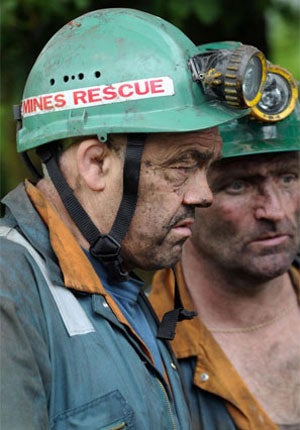Tragedy in the Valleys
The Welsh mining disaster was a throwback from an age of grim toil and worker solidarity. Emily Dugan visited a village in shock

In the valley beneath the entrance to the Gleision mine in Wales, a bench commemorates the Primrose Colliery disaster of 1858. A shiny plaque – recently unveiled – describes how 14 men and boys died there. It was placed to mark a time when men took their lives in their hands every time they went to work. Yesterday it was a bitter reminder that those days are not completely gone.
Since it was announced on Friday evening that all four of the men trapped in Gleision colliery had been found dead after the shaft they were working in flooded with water, families, friends and fellow workers have been struggling to understand why such disasters still happen.
Wayne Thomas, local representative of the National Union of Mineworkers and a friend of the miners who died, said: "I've known nothing of this in my lifetime – it's like a scene out history." But for those working in small private mines like Gleision, many of the hardships and dangers remain startlingly similar to those faced centuries ago. "The method used in a small mine is the same basic method that's been used for hundreds of years," said Mr Thomas.
Like many small drift mines, the tunnels the men work through are often narrow, requiring them to struggle on their knees as they lay charges. Despite these hardships, one thing that seems to have united the four men who died – Charles Breslin, 62, David Powell, 50, Phillip Hill, 45, and Garry Jenkins, 39 – is a dedication to mining itself.
In truth, they were from a diminishing breed: from 1,250,000 in 1920 to 700,000 half a century ago, today barely more than 3,500 men are employed underground mining coal in the UK. The four killed in Gleision made up almost half of the mine's tiny staff of nine. They were skilled and hard working. Despite this, according to Mr Thomas, they were not likely to have been earning more than about £500 a week. David Powell, like his colleagues, took pride in his work. He was involved in maintenance and would go to the mine at weekends even when he wasn't on a shift, to make sure the pumps were working.
Rosalyn Davies, a Neath Port Talbot councillor and friend of three of the dead miners' families, said hard work had united the men. "These were hard-working family men. From where I live I can see the vehicles going to the mine. Sometimes people would be working there until eleven o'clock. You've got to be hard-working to work underground, haven't you?"
She was in Rhos community centre until 11pm on Friday supporting those affected by the tragedy. Yesterday she was at home, shattered by the previous 48 hours. "In the beginning the families were quite positive, even after they had found one person. After the second and the third it changed," she said. An appeal fund to support the families has been set up by Neath MP Peter Hain.
The mine passed an inspection in May, but local sources said yesterday that plans of the mine suggested the men could have been working in a section that was not licensed for mining. This may explain why they were working so dangerously near water which was clearly marked on maps.
Peter Hain said: "I was very surprised to see from the maps how close they were working to underground water in the old mine... but I spoke to some of the families including one of the miners who escaped when his father died in the tragedy [Daniel Powell]. I asked whether there had been any safety concerns and he said no."
A Health and Safety Executive spokesman said they couldn't discuss details during an investigation. An ambulance was used as a makeshift block at the entrance to the mine yesterday as the inquiry began. The colliery had been due an inspection from the HSE later this year.
The NUM is concerned that smaller mines often have poorer safety standards to keep costs down. Gleision is understood to have been in financial trouble in recent months.
In Godre'r Graig, the village where David "Dai bull" Powell lived with his wife Lynette and son Daniel – who survived the disaster – there is an eerie silence. A friend of the Powell family, Steve Thomas, 53, from Cwmtwrch, said: "It's always been the same around here. I'm not a miner – never have been – but whatever the state of the mine, it's four lives gone."
One former miner said that events in Chile had given people false hope. "In this area, we know that's not the way it goes. If people choose the profession, they understand the risks. We know it's primitive, but that's what we built the community on."
Subscribe to Independent Premium to bookmark this article
Want to bookmark your favourite articles and stories to read or reference later? Start your Independent Premium subscription today.

Join our commenting forum
Join thought-provoking conversations, follow other Independent readers and see their replies